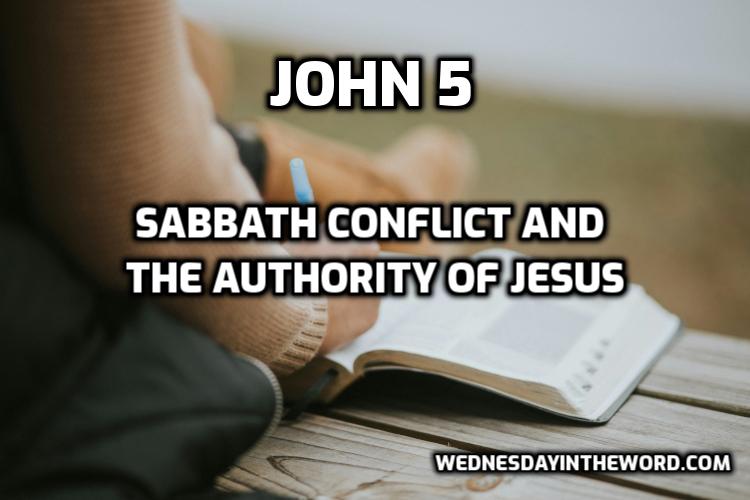Sabbath Conflict and the Authority of Jesus (John 5)
Jesus heals an invalid on the Sabbath. Instead of marveling at this miracle, the Jewish leaders are incensed by the violation of their strict Sabbath laws.
Review
John wrote to people who must decide to believe based on the testimony of others, particularly the writings of the apostles. John’s audience faces the additional barrier of accepting Jesus as the Jewish Messiah when most of the Jews they know reject him.
In this climate, John explores how eternal life comes to those who believe that Jesus is the Christ.
He’s exploring the issues surround belief, such as the evidence that Jesus is the Christ; the importance and veracity of testimony, and the dynamics of belief and unbelief.
In chapter 5, John widens his focus to include the growing hostility from the Jewish leadership.
Jesus heals on the Sabbath (John 5:1-15)
- Many Bible omit John 5:4 because it’s likely a monk added it later during the copy process.
- The feast mentioned is John 5:1 is probably the second Passover of the public ministry of Jesus.
- The pool was probably fed by a mineral hot spring believed to have healing properties.
- We’re not told whether the healed man believed Jesus was the Messiah or not.
- Evidence suggests he didn’t. First, he blames Jesus for telling him to carry his pallet (work) on the Sabbath. Then he turns Jesus into the authorities after learning his name.
- John is interested in how the Jewish authorities respond to Jesus’ healing on the Sabbath.
Conflict with the Authorities (John 5:16-18)
- The Jews complain Jesus broke their Sabbath rules by healing this man and telling him to carry his pallet.
- The rabbis debated whether God’s Sabbath rest after creation was a onetime rest or a pattern he continued to the present day. Most thought God worked on the Sabbath.
- Jesus responds, he is doing the work his Father asked him to do regardless of the day of the week.
- The leaders become even more upset that Jesus called God his Father.
- Calling God his Father is a reference to being the Messiah, the Son of God.
- The eldest son in a Jewish household had the authority to act for and represent his father.
Jesus Respons (John 5:19-30)
Jesus responds to three ideas that anger the Jewish leaders:
- They don’t like Jesus calling God his Father.
- They think Jesus is working on the Sabbath.
- Their unbelief is a symptom of their hostility toward God.
God as Father
- A son apprenticed with his father by watching and shadowing him.
- Since fathers love their sons, fathers teach their sons everything they need to know to succeed.
- Likewise, His heavenly Father teaches Jesus everything he needs to know.
- Jesus responds, he’s not a stubborn willful Sabbath breaker. He is a dutiful son doing exactly what his Father wants him to do.
Working on the Sabbath
- The Jews are angry about one little healing on the Sabbath. Jesus raises the stakes.
- He claims God placed the destiny of every single human being on the planet throughout history in his hands.
- Jesus says, today my work was to heal this man’s sickness. But my Father has given me much more work than that. The Father has given me the power over life and death.
Belief as a Matter of the Will
- Jesus is teaching and doing only what his Father asks him to do.
- The way they respond to Jesus reflects the way they respond to God.
Testimony and Evidence (John 5:31-25)
If Jesus was the only one making this audacious claim, we would be right to be skeptical. But his testimony is not the only testimony.
- John the Baptist also testifies Jesus is the Christ.
- God testifies Jesus is the Christ through the miracles Jesus does.
- God testifies Jesus is the Christ through the Old Testament Scriptures.
The Pharisees refuse to believe Jesus is the Messiah because they don’t want to believe. They care more about praise from their peers than praise from God. They are unwilling to believe Jesus because they don’t want what Jesus offers.
Please listen to the podcast for more detail and explanation.
Next: 13 The Bread of Life (John 6)
Previous: 11 True Worship: The Woman at the Well, Part 2 (John 4)
Series: Gospel of John: Believe and Find Life
Study: Gospel of John Bible Study Resources
Podcast season 25, episode 12
Page Views: 427
